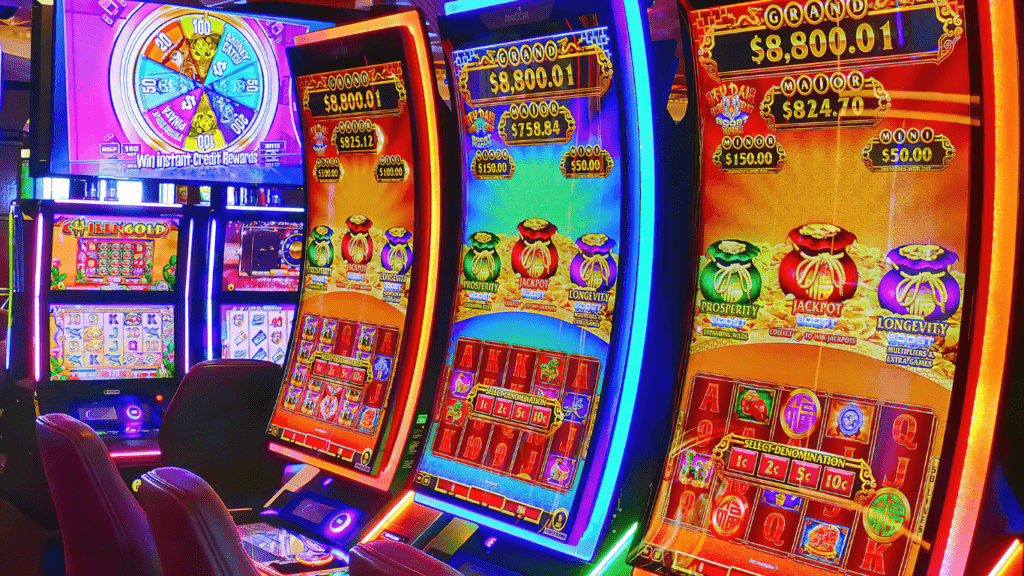I’ve always loved the thrill of spinning the reels, the flashing lights, and the rush of anticipation that comes with every slot game. But let’s face it—playing slots isn’t just about luck. There’s a mindset behind turning a casual pastime into a more rewarding experience. It’s not about chasing jackpots blindly; it’s about playing smart and staying in control.
Slots can be a lot more fun when you approach them with a winning mindset. Whether you’re a seasoned player or just starting out, understanding how to balance entertainment with strategy can make all the difference. It’s not just about hitting the big win—it’s about enjoying the game while making smarter choices along the way.
Understanding Slot Machines
Slot machines combine technology and randomization to create an exciting gaming experience. Though they seem straightforward, understanding their mechanics gives players an edge.
How Slot Machines Work
Slot machines operate using Random Number Generators (RNGs), which produce thousands of number combinations per second. Each spin’s outcome depends on the precise moment you press the spin button, aligning specific symbols on the reels with these combinations. Paylines determine winnings, varying from single-line machines to those with hundreds of lines. Higher paylines increase potential rewards but also raise the cost per spin.
Modern slots often feature additional elements, including scatter symbols triggering bonus games, wilds replacing other symbols, and progressive jackpots linking multiple machines for larger prizes. Checking the machine’s Return to Player (RTP) percentage, which typically ranges from 85% to 98%, helps estimate long-term payouts.
Debunking Myths About Slots
Many players believe in patterns or strategies to manipulate slot outcomes, but these myths lack basis. For example:
- “Hot” and “Cold” Machines: RNGs ensure every spin is independent, making streaks irrelevant.
- Timing Payouts: Machines cannot be “due” for a win since RNGs reset instantly after each spin.
- Betting Size Affects Wins: While larger bets may unlock higher jackpots or bonus features, they don’t directly affect the randomness of results.
Focusing on understanding game rules, features, and payout structures improves overall success instead of relying on unfounded myths.
Developing a Winning Mindset
Maintaining the right mindset transforms slot gaming into a more rewarding and enjoyable experience. I focus on self-control, realistic expectations, and emotional regulation to stay on track while playing responsibly.
The Importance of Self-Control
Self-control prevents chasing losses or overextending a budget. I always set a clear spending limit before playing, ensuring I stick to it regardless of outcomes. This habit keeps my sessions enjoyable without financial stress.
Setting Realistic Goals
Realistic goals keep expectations grounded and reduce disappointment. I approach slots as a form of entertainment, not a guaranteed way to make money. When I set modest targets, like extending playtime or hitting small wins, I enhance my overall experience.
Managing Emotions During Play
Managing emotions reduces impulsive decisions. Excitement and frustration can arise, but I remain calm and focused, knowing the results rely on RNGs. Stepping away when emotions peak helps me reset and return with a clearer mindset.
Strategies for Playing Slots

Playing slots strategically transforms the experience from random fun into a more controlled and rewarding activity. I focus on effective planning and thoughtful choices to optimize enjoyment and potential success.
Bankroll Management Tips
- Controlling spending is crucial for responsible slot play.
- I always determine a fixed bankroll before starting, ensuring it’s an amount I’m comfortable losing without financial strain.
- Dividing the total bankroll into smaller session budgets helps me play longer without overspending. For example, if my budget is $200, I might allocate $50 per session.
- I also stick to bets proportionate to my bankroll to avoid exhausting it quickly.
- Betting 1%-2% of my total budget per spin is my general rule, so a $200 bankroll would mean $2-$4 bets each time.
This strategy keeps me in the game longer while minimizing losses.
Choosing the Right Slot Games
Picking the right slot matches my preferences and strategies. I evaluate the slot’s RTP (Return to Player) percentage, prioritizing games with RTP values above 96% to maximize long-term payouts. Games like “Mega Joker” or “Blood Suckers” often offer favorable RTPs.
Additionally, I examine the slot’s volatility. Low-volatility slots provide frequent but smaller wins, perfect for sustaining longer gameplay, while high-volatility games, like “Book of Dead,” offer larger potential rewards but less consistent payouts. I tailor my choice to suit my risk tolerance and goals.
Recognizing Payout Patterns
While slots are based on RNGs, understanding payout potential improves game selection. I analyze the paytable to identify high-value symbols, multipliers, and bonus features. Slots with free spins, wilds, and jackpot features often increase payout opportunities.
I also monitor my sessions without assuming patterns indicate future outcomes. If a slot game becomes unprofitable over time, I move to another option rather than chasing losses. This approach helps me stay disciplined while enjoying the variance slots offer.
Balancing Fun and Fortune
Slot gaming combines entertainment and opportunity, but maintaining this balance ensures a more enjoyable and responsible experience. I focus on strategies that enhance enjoyment while keeping potential profits secondary.
Prioritizing Entertainment Over Profit
Viewing slots as entertainment makes each spin rewarding, even when jackpots don’t hit. I set a budget exclusively for leisure, treating any wins as a bonus rather than a primary goal. Instead of fixating on potential earnings, I select games with themes, visuals, or features I enjoy. For example, I prefer slots with engaging bonus rounds and free spins, which enhance the overall fun. Taking this approach reduces disappointment and keeps the gaming experience lighthearted.
Knowing When to Walk Away
Recognizing the ideal time to step back maintains control and prevents losses from escalating. I stop playing once I reach a set limit, whether it’s a loss or a profit goal. For instance, if I lose 20% of my session budget or double my original stake, I take a break. Walking away when frustration or overexcitement peaks protects both my mindset and finances. This discipline ensures I return to the game refreshed, maintaining balance between enjoyment and responsibility.



